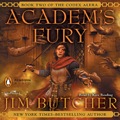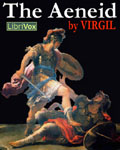
 Academ’s Fury
Academ’s Fury
By Jim Butcher; Read by Kate Reading
17 CDs – 21 Hours [UNABRIDGED]
Publisher: Penguin Audio
Published: 2008
ISBN: 0143143772
Themes: / Fantasy / High Fantasy / Elementals / Battle / Primitive Culture / Rome /
Having been a fan of Jim Butcher’s urban fantasy Dresden Files series for some time, as well as a consummate reader of traditional fantasy, I recently decided to delve into the author’s Codex Alera series. I found the series opener, Furies of Calderon, to be a solid entry for Butcher into the epic fantasy genre, but my recent review also pointed to some room for improvement. After devouring its sequel, Academ’s Fury, I’m happy to report that Butcher has found his voice and set the tone for the series.
A brief refresher: the Codex Alera series takes place in the land of, you guessed it, Alera, whose inhabitants possess the ability to control elemental powers called furies. The lone exception is the series’s prime protagonist, Tavi, who has come of age without developing any apparent skill in furycrafting.
Academ’s Fury skips ahead two years from the conclusion of the previous book, and finds Tavi studying at the Academy of Alera Imperia, the land’s capitol city. The novel thus adopts many tropes of the “school novel”: bullies, arrogant teachers, and mischievous rule-breaking. Tavi also gains a window into the realm’s politics by serving as page to First Lord Gaius Sextus. Further raising the stakes, an isolated adventure in Furies of Calderon turns out to have disastrous implications both for the valley of Calderon and for the imperial city itself. The result is a novel that weaves these plot treads together into a rich, satisfying tapestry.
Like its predecessor, Academ’s Fury follows the viewpoints of several characters, although Tavi is clearly the linchpin. The Cursor Amara, siblings Bernard and Isana, and the treacherous Fidelias all reprise their roles, and all these develop in significant and sometimes surprising ways. The Marat wolf tribe, which played a pivotal part in Furies of Calderon, also returns under the capable leadership of Chieftain Doroga. The chieftain’s spirited daughter Kitai also figures heavily in the story. Several new characters join these veterans in the tale’s events. The only notable standout from among them, for me, is Antillar Maximus, Tavi’s fiercely loyal friend at the Academy.
More importantly, Academ’s Fury expands the scope of the world of Codex Alera by introducing two new races: the wolf-like canim and the insectile Vord. Both races possess serious martial prowess and present a serious threat to Alera. Unlike the Canim, however, the cold, calculating Vord cannot be reasoned with. By means of worm-like parasitic scouts, the Vord take possession of humans, preserving their physical stature and mental abilities but blotting out their souls. This dynamic makes for a few horrific scenes of which Stephen King might be proud, and the Vord warriors and queens ooze vileness and evil both literally and metaphorically. The battle scenes in Academ’s Fury resemble those of R. A. Salvatore or early Terry Brooks in their invention and frenetic pace.
Jim Butcher utilizes the novel’s setting in the Academy at Alera Imperia to disseminate information about the world without resorting to mere “info-dump” modalities. Through Tavi’s readings, dialogues, and examinations, the book takes a deeper look into the history of Alera, including its tenuous connections to the Rome of our world. We also get a brief glimpse under the hood at the mechanics of furycrafting.
The novel’s greater breadth of scope and its focus on Romanesque political intrigues address the major complaints I had with the first book, but Academ’s Fury still isn’t perfect. For one thing, the pacing flags somewhat near the end. A bigger defect, to my mind, has to do with the character development. Most of the characters do develop in interesting and believable ways, but a few of them come off as flat. Sadly, this is true in some ways of Tavi, who always seems to get the better of his rage, his fear, or his other negative traits. He’s a fascinating character, but his lack of internal conflict and teenage angst diminishes his believability. Similarly Doroga, the Marat chieftain, fits too perfectly the archetype of the “noble savage”. He’s a lovable character, but he exists in a hundred other variations in a hundred other fantasy books.
Kate Reading’s performance once again brings the Codex Alera series to life. Each character receives full articulation, so that even without dialogue tags it’s clear who’s doing the talking. The Latin scholar in me occasionally winces at her non-classical pronunciation of certain words (she renders princeps “prin-SEPS” instead of “prin-KEPS”), most listeners probably won’t take issue with such minor details.
Minor qualms aside, Academ’s Fury improves on the first novel of the Codex Alera and continues to promise great things for the series.
Posted by Seth Wilson

 Reading, Short And Deep #078
Reading, Short And Deep #078
 Siege Perilous (The Mongoliad Cycle #5)
Siege Perilous (The Mongoliad Cycle #5) Academ’s Fury
Academ’s Fury
 Out now from LibriVox is an early English translation of an epic poem. Aeneas’s story is the story of the foundations of the Roman republic and the Roman empire. Its ethos plays an important role in shaping who we are nearly two millennia after it was written. I think of it as the first in a long tradition of NOIR LITERATURE. Sure, you thought that the story of Romulus and Remus was grim. But that’s much later in the history of the Roman people – at least according to the greatest Roman poet, Publius Vergilius Maro, better known as Virgil. Virgil wrote this earlier history of the Roman origins for his Emperor, Gaius Julius Caesar Octavianus, better known as Augustus.
Out now from LibriVox is an early English translation of an epic poem. Aeneas’s story is the story of the foundations of the Roman republic and the Roman empire. Its ethos plays an important role in shaping who we are nearly two millennia after it was written. I think of it as the first in a long tradition of NOIR LITERATURE. Sure, you thought that the story of Romulus and Remus was grim. But that’s much later in the history of the Roman people – at least according to the greatest Roman poet, Publius Vergilius Maro, better known as Virgil. Virgil wrote this earlier history of the Roman origins for his Emperor, Gaius Julius Caesar Octavianus, better known as Augustus. 